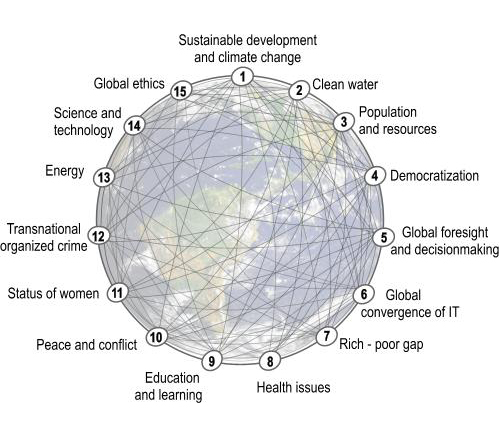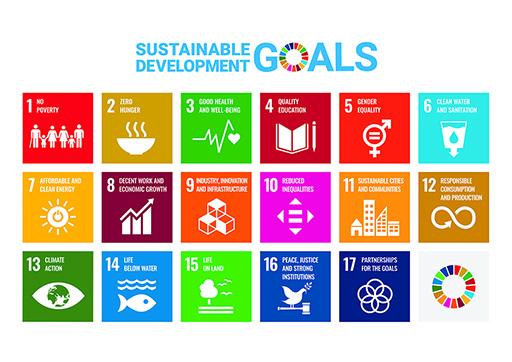1.1 Sustainable futures
Those focusing on futures planning also now need to ensure that sustainability is an embedded part of their approach. The Millennium Project [Tip: hold Ctrl and click a link to open it in a new tab. (Hide tip)] , a global participatory think tank established in 1996, identifies 15 Global Challenges that have an impact on the future – see Figure 2.
For those familiar with the UN Sustainable Development Goals (SDGs), you will note the similarities of these global challenges to the UN SDGs shown in Figure 3.
The challenge is to balance the UN global goals for sustainable development with the needs for organisations to evolve, especially in relation to digital transformation which, due to innovation and development as well as the impact of the COVID-19 pandemic, has had an unprecedented acceleration. This will continue to require organisations to embrace technology and ensure they have the capability to utilise it to its full potential. The World Economic Forum article ‘17 ways technology could change the world by 2025’ written in June 2020, during the global COVID-19 pandemic, provides insights into the technology we may already need to understand and engage with, in both our personal and professional lives (World Economic Fourm, 2020).
The unintended benefits to the environment during lockdown during the COVID-19 pandemic ‘due to movement restrictions and a significant slowdown of social and economic activities has led to the air quality improving in many cities with a reduction in water pollution in different parts of the world’ (Rume and Islam, 2020). These benefits are being rapidly reserved as we move more freely again, leading to the question: how can organisations adapt, drawing on appropriate evidence and research to ensure that net-zero targets are achieved?
All UK organisations are required by law to reduce their carbon emissions. The approach to this varies throughout the UK. You can explore these for your nation via the links below:
- Wales – Well-being of Future Generations (Wales) Act 2015 (Public bodies only) and Environment (Wales) Act 2016 (Legislation.gov.uk, n.d.a)
- England – Climate Change Act 2008 (Legislation.gov.uk, n.d.b) and ‘Sustainability and climate change: a strategy for the education and children’s services systems’ (GOV.UK, 2022)
- Scotland – Climate Change (Emissions Reduction Targets) (Scotland) Act 2019 (Gov.SCOTLAND, n.d.)
- Northern Ireland – Northern Ireland Climate Change Adaptation Programme (Department of Agriculture, Environment and Rural Affairs, n.d.)


